- Home
- Phil Geusz
Lieutenant (The David Birkenhead Series) Page 9
Lieutenant (The David Birkenhead Series) Read online
Page 9
“Right,” I agreed, edging further behind the armor. “But the turret, chief! How’s it coming?”
“I’ve got slow traverse only, no elevation. Another two or three minutes and I’ll have that, too.”
I scowled, picturing the situation in my mind. The current elevation ought to be fairly close… “Swing her around!” I ordered. “Towards the destroyers! Right now—don’t wait!”
“But…” the chief objected. “It won’t shoot!”
“Do it!” I screamed for the second time that day. “Now! You and I know it won’t shoot! But the Imperials don’t know that!”
There was a short silence. “Traversing now!”
I stuck my head back above the plate and watched. The destroyers had already been edging away from their damaged sister; now it was as if they’d suddenly realized they were knee-deep in cobras. Which they actually would’ve been, of course, had the turret been operational. Their Fields hardened, and then they were racing away, dodging madly. “Track them as best you can under local control,” I ordered as the cripple attempted to follow. This set off yet another chain of secondary explosions, and in my heart I knew she didn’t have long. It was time for me to find a safer place to watch from. “And get the elevation working as soon as you can!”
Lancrest probably ‘aye-ayed’ me, but I didn’t hear it. Because a single blaster-bolt erupted out of the ruins of the bridge and clipped the side of my helmet just hard enough to crack it. Instantly the air began whistling out, and I was forced to duck back under cover in order to apply an emergency patch. I had to use the largest in my kit, and it blocked half my visor. Even worse it didn’t seal well; I was still losing a lot of air. So much that I only had a few minutes to find pressure. That didn’t leave me much in the way of a margin of error. I stuck my head out again…
…and another bolt sizzled across my shoulder, creating yet another leak. Damnit, he had me cold!
Frantically I patched myself again, then dove down deeper into my hidey-hole hoping to find another way out. But there wasn’t, at least for not anything bigger than a mouse. Desperately I looked up at the doomed destroyer—it was making good speed for a cripple, but that couldn’t last. Maybe it’d blow up spectacularly, offering a diversion? I waited and waited long seconds as the air roared out past my left ear…
…and the stubborn destroyer continued to thrust away just fine, if anything making less of a show than it had before.
Soon a new red light appeared in my display; I had no more time to waste waiting for a lucky diversion. So I gritted my teeth, stood up and then kept right on moving even after a blaster-bolt knocked my own gun out of my hand. I turned my thrusters on max, charging the sea of twisted compartments where I thought the enemy fire might be coming from. Another bolt flew by, this one finally a clean miss. But I had a long way to go, and was only becoming an easier and easier target. I tried, Father, I found myself murmuring. I tried so hard…
Then two more blasters fired, targeted on the ruins I was racing towards for all I was worth. One bolt missed, but the other must’ve struck a grenade or something because there was a small explosion. A detached combat-suited arm drifted out still clutching an Imperial blaster-rifle, then Snow and Devin stuck their heads up and waved gleefully at me. “We’re sorry, sir,” Snow explained over the slave-link. “But we’ve decided not to surrender. All of us, that is. We hope you’ll understand.”
“We can’t surrender, if it means losing you,” Devin amplified. “I mean… How could we ever look another bunny in the eye again after letting that happen?”
21
The destroyers kept right on running until they Jumped back into Imperial space. Lancrest and his staff cheered themselves hoarse at the sight, and do did the Rabbits. But really it was the only thing our enemies could do. Absent their marines they were impotent to do much of anything about us, and the turret’s threat was something they absolutely, positively couldn’t ignore. While they must’ve wondered why we never opened fire the improvised training system was jerky and slow, which they certainly must’ve seen. Since fast-moving destroyers made difficult targets at the best of times, their only safe bet was to assume that we’d simply never been able to line them up properly. And most naval officers tended to favor the safest of bets, at least when expensive vessels were at stake. Not to mention their careers.
So, I suppose, we actually did have something to cheer about even though the third, damaged destroyer successfully Jumped as well. I still doubted she’d make it home, but couldn’t count her as a kill in the Station log, either. That bothered me. Perhaps I should’ve nailed her in the blaster-accumulators instead?
But it was too late for regrets and might-have-beens. Instead there was a huge amount of work to be done and little time to do it in. The very first thing I had to do was thank my Rabbits. I assembled them on the mess deck and asked each individually if they really and truly wanted to volunteer. Every single one did, so I legally swore them into the navy, grinning evilly at the conniption fits this was going to cause among the lawyers back home. Then I thanked them as well as I could, both for signing up and saving my life, and promised them on my honor a better future no matter what happened—if we survived, that was. “Three cheers for David!” Devin cried out. For a moment the mess deck thundered with lapine voices, and I fear I shed a tear or two. Even the chief and his men seemed moved by their willingness to fight.
“We’ll treat you Rabbits fair,” they promised. “Like shipmates, not slaves. You’ve earned it and more.” Then they cheered me as well!
Having a few dozen fighting men I could count on eased the situation enormously, but there was still an unbelievable amount of work to be done. My first task was to break up the Rabbits into squads along lines nearly identical to their previous work-units. They were accustomed to these groupings and I saw no need to mess with a good thing merely in order to comply with a standardized organizational model. I assigned Fremont and his suit-techs to help out the engine-room gang as much as their other duties allowed, and put Snow in charge of recovering and repairing as many weapons as possible. Especially I trained him on how to combine grenades into improvised demolition charges, since these had proven so effective and we had far more grenades than charges. Devin’s crew became ersatz marines; while their marksmanship and tactical skills and such might need work they were more experienced able-spacers and null-gee hands than most of their human equivalents, and of the two in my opinion this was the more important qualification. The rest I somewhat sadly relegated to routine ship’s duties that simply had to be performed, largely the same work they’d done as slaves. I took the time to explain how vital their tasks were, however, and also promised them that I’d have Devin’s squad train them in weapon-handling just as soon as they themselves mastered the art. They nodded soberly, swore they’d give it their best and, well…
…I never saw such clean heads on any naval installation in all my life.
That left Nestor to deal with; he’d never been part of a work-unit because of the way the captain had, well… For the first couple days I assigned him to the general labor pool. Soon, however, I came to realize that I just couldn’t keep up with everything on my own. Back at the Academy I’d been assigned a personal servant for the simple reason that it was impossible to cope with all the demands on my time without one. Now I found myself in precisely the same situation once again. After my second day of not-eating for lack of time and sleeping in my uniform I took Nestor aside and, making it very clear that it was perfectly okay if he refused, offered him the job. His answer was a grin and a hug, and from that day forward he spent every possible moment making himself useful to me, doing everything from laundering my clothing to running messages all over Zombie. He stood proud and tall, and though at first I didn’t want to believe it soon even I could see that the other Rabbits envied him.
And so I found myself wandering endlessly about Zombie, one moment explaining to Devin’s bunnies about what a flank was and wh
y they were important and the next nodding to the chief as he gleefully explained his next major project and how he thought it might perhaps further confound the Imperials. In-between I labored endlessly at my own responsibilities. The one that occupied the most worry-time was our most crucial supply problem. Almost my first action after the Imperials retreated was to round up every scrap of hay on the station and arrange for strict rationing. Things weren’t quite as bleak as I’d first feared; we found three dozen undersized bales of ancient, mouldery stuff in the slave quarters, and a little computer research revealed that we could stretch things a little further by allocating all the bamboo shoots and alfalfa sprouts and such in the Station larder to we Rabbits. Our human crewmates didn’t seem to mind at all that we were hogging all the greenery— there was plenty of high-quality beefsteak and other luxury-meats in the deep freeze as well, enough for them to eat like kings for months to come. Meanwhile I allocated the worst of the hay to myself and sent out a work party to see if they could find any wood that might be reduced to sawdust. There wasn’t much and it neither tasted good nor was as healthy for us as hay, but it’d help eke out our supplies a few more days. Sadly the library didn’t suggest much else in the way of potential substitutes. Partly this was because hay was normally so cheap and easy to store, and partly it was because we Rabbits tended to die so quickly in the absence of the real McCoy. There wasn’t much motivation, in other words, for anyone to run a lot of experiments.
I never expected the Imperials to come Jumping back through at us the moment their destroyers arrived back home with the bad news, and they didn’t. War plans are complex, carefully-laid-out things based on highly specialized and limited resources, and they can’t easily be significantly altered once put into motion. Almost certainly the Imperials had assumed that retaking the still-ruined Station would be a walkover—the clearest evidence of this was that they’d sent just the three destroyers. Therefore, it followed, they’d allocated their troops and even more precious assault ships elsewhere. And, of course, they only had one line-of-battle fleet; large warships were ruinously expensive. Their big ships were almost certainly somewhere far away, counterbalancing their Royal equivalents and therefore unavailable for other tasks. Yet these were exactly the resources it’d take to neutralize Zombie, even though it was only functional in a limited way. It’d be months, I reckoned, before a serious attack could be mounted against us. All that time, however, the Imperial convoys and other vital military traffic would be backing up. Certainly the admirals on the other side would feel compelled to do something about that.
But what?
22
“David to the bridge!” a lapine voice rang out over the Station annunciator late one Sunday night about three weeks after the destroyers vanished. It was Fremont; in addition to their other duties his Rabbits were now monitoring the Station’s sensors. That made them improvised watchkeepers, or at least the nearest thing I had. “David to the bridge!”
I rolled over and blinked my bleary eyes; it was just past midnight, and I’d been asleep for perhaps an hour. Good rest had been terribly hard to come by lately, not least because my belly was continually rumbling and gurgling for lack of good hay. Even worse, Fremont and his gang were still terribly uncertain about when I should and shouldn’t be called, so they did so far too often. “What is it?” I asked patiently into the comm-link conveniently built into the head of my bed—I was sleeping in the former commander’s quarters for that very reason.
“Something has Jumped into local space, sir. It’s moving fast.”
“Right,” I agreed, rolling out of bed. “I’ll come.” At least it wasn’t just a high enviro-tank pressure reading this time!
By the time I arrived at our improvised command center down in Tunnel Zero—it consisted of little but a sensor-station and primitive communications console—I was at least slightly more awake. “Here,” Nestor said, appearing out of nowhere and pressing a warm, fragrant cup into my hand.
“Thanks,” I replied, accepting the cup like a gift from the gods. I’d never, ever figure out how Nestor managed to produce the stuff out of seemingly nowhere, again and again and again. It was human tea, far too strong for any of the other Rabbits. But I’d had more experience with exotic foods than the rest, and had recently discovered that certain teas helped ease my troubled stomach. Besides, it was loaded to the gills with caffeine. This seemed like a wonderful idea indeed just then. I took a sip and felt the first mental clouds begin to dissipate. “You ought to make yourself a cup too, and force it down. It’d do you good—you’re eating the same garbage I am.”
Nestor smiled and nodded, but I knew he’d never do it. Even though I was probably right about it being good for his belly—he was consuming the same moldy stuff I was, and refused everything else. “Perhaps later, sir.”
I sighed and turned to other, more urgent matters. “You were right to call me, Fremont,” I began. My standard routine when summoned to the bridge was to gently explain to whichever Rabbit was in charge whether they’d done right or wrong, and why. They had to learn, and this was the best way I could think of to help them along. “Thank you.”
He smiled and sat up a little straighter. “This time it was pretty easy to figure out, sir.” Then he turned a knob and a blip appeared on a tiny, improvised viewscreen. “It’s squawking Imperial. And moving very fast.”
I leaned over his shoulder and scowled. “That’s a spy-ship,” I explained. “All thrusters and super-sensors, no weapons. We can’t do much except to let them take their pictures. Though again, you were right to call me.”
Fremont nodded. “This is what you said we should probably expect next.”
I stepped over to our improvised communications center. The original electronics had been wiped out due to an EMP in an earlier attack, so I had to physically move a little plug as in the days of old. “Engineering!” I said into the microphone. “Are you there, Chief?”
Aboard an active ship of war or fully operational Station, the delay would’ve been long enough to be unforgiveable. But the chief was working every bit as hard as I was under equally poor conditions, and was probably even deeper asleep. “Yes, David?” he finally replied.
“We have company,” I explained. “Just a little recon ship—I’m not going to call general quarters over it. But… Initiate Head Game One.”
There was another short pause, and I could easily picture Lancrest grinning into the darkness with his hair pointing all which-way and three days worth of beard from where he hadn’t had time to shave. Head Game One had been his idea, one I’d instantly approved. “Sure thing, David! I’ll see to it at once.”
“What’s he going to do, sir?” Fremont asked in his usual friendly way—I hadn’t attempted to teach my fellow Rabbits bridge-discipline, or anything remotely like when and how to salute and say ‘aye-aye sir’. Not only did spit-and-polish fail to match up with the kind of brotherly relationship that our special circumstances dictated, but I wouldn’t have had time if I’d tried. So instead of simply demanding silence in the command center like almost any other officer would’ve, I answered his question.
“Our friends on the other side are taking pictures of us just as fast they can,” I explained. “When they get home a bunch of highly-trained bigwigs will spend hour after hour studying them. Normally we’d just play dead and let them infer whatever they’re able from what we can’t help but show. The chief, however, had a brainstorm. We’re going to stimulate their imaginations, you see. And with luck, their paranoia.”
Fremont blinked, but asked no more questions. He did remain on the bridge, however, when his relief came in and took over about two hours later so that he could watch. Just then, about thirty minutes before the Imperial scout was at its point of closest approach Lancrest reported in. “Here we go, David!”
I smiled as the tiny viewscreen changed over to the “Engineering Status” readout I was so familiar with from my days as an apprentice. First our navigational lights blinke
d, one sector at a time and then several at once in no discernable pattern at all. ‘What can it mean?’ I could almost hear the Imperial brass asking itself for hours on end, when in fact it meant nothing at all. Then Lancrest diverted the main power to the Station’s armament, and slowly our single battered turret began to swing. The charging banks were coupled to wreckage, of course; though the chief was busily at work on that little problem, for the moment all we were doing was wasting an incredible amount of power. The spy-vessel’s sensors, advanced as they undoubtedly were, couldn’t possibly determine what was still broken and what wasn't deep down in Zombie's guts. All they could detect was the pre-firing power surge. Suddenly the little ship was dancing through the sky on a complex evasive course.
“Now,” Lancrest declared, just as the useless turret swung into line with the supposed target. Right on schedule the main breakers tripped out and we suffered a simulated critical power failure. Only the emergency systems and controls remained on-line.
“Beautiful, Chief!” I whispered as the scout ship danced and whirled, still reluctant to resume a steady course. “Outstanding, even! Fantastic work! Far better they should think we’re having difficulty firing than that we can’t fire at all.” Then I stood and sipped tea and tried not to think about fresh, sweet hay as the enemy vessel finished its sweep and Jumped back out of our universe.
23
It was sixteen and a half days before our playmates returned. This time I happened to already be down in the command center anyway, explaining a new systems readout to Fremont’s right-hand bun Douglas. Suddenly Bip! Bip! Bip! one after another eleven Imperial ships appeared in local space in tight formation. “Man your battle stations, everyone!” I personally declared into the Station’s annunciator circuit. “All hands to your battle stations!”
It didn’t take long to figure out what the enemy was up to this time around; the chief’s station was the most difficult to prepare for action, and by the time he reported in we already knew what we were dealing with. Two of the Imperials were destroyers and the rest nice slow merchantmen. Presumably our enemies still didn’t have any heavy units or an assault force at hand, but traffic was so backed up they were willing to gamble on pushing a convoy through anyway. I had to respect them for that; it was gutsier than anything our own high command would likely attempt, if I were any judge. But they’d made one key mistake, and that was to enter Zombie space via the same node that practically all of their navy had used during the last war. Many of our ‘dead’ guns had been knocked out while engaging Imperial vessels traveling along precisely this same relative track…

 Descent Book 1: Descent from Man
Descent Book 1: Descent from Man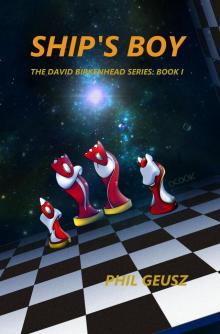 Ship's Boy
Ship's Boy Early Byrd
Early Byrd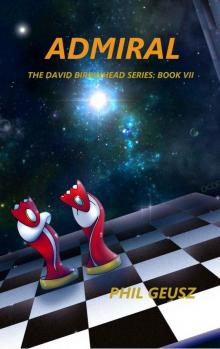 Admiral (The David Birkenhead Series)
Admiral (The David Birkenhead Series)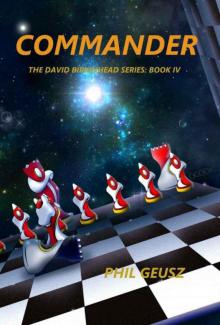 Commander
Commander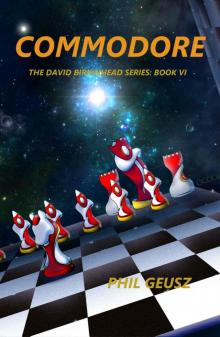 Commodore (The David Birkenhead Series)
Commodore (The David Birkenhead Series)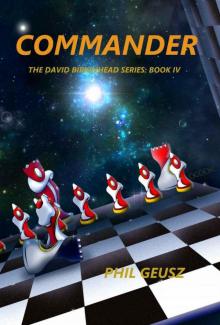 Commander (The David Birkenhead Series)
Commander (The David Birkenhead Series)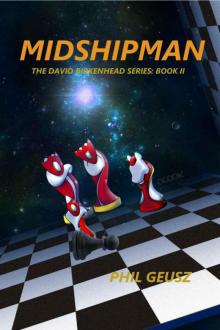 Midshipman
Midshipman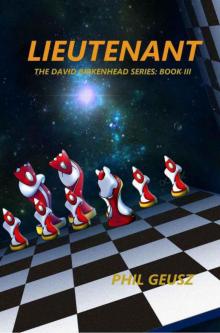 Lieutenant
Lieutenant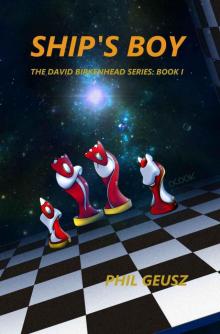 Ship's Boy (The David Birkenhead Series)
Ship's Boy (The David Birkenhead Series)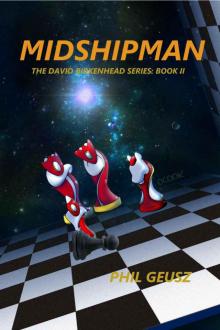 Midshipman (The David Birkenhead Series)
Midshipman (The David Birkenhead Series)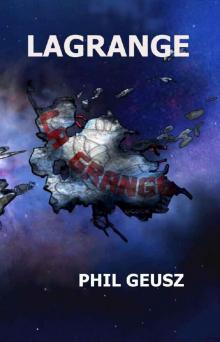 Lagrange
Lagrange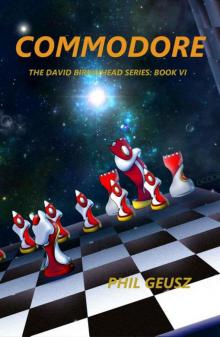 Commodore
Commodore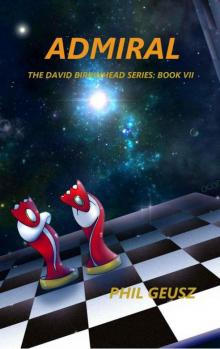 Admiral
Admiral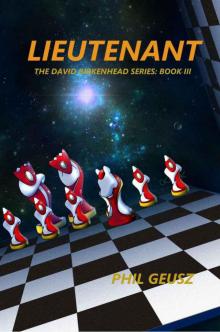 Lieutenant (The David Birkenhead Series)
Lieutenant (The David Birkenhead Series)